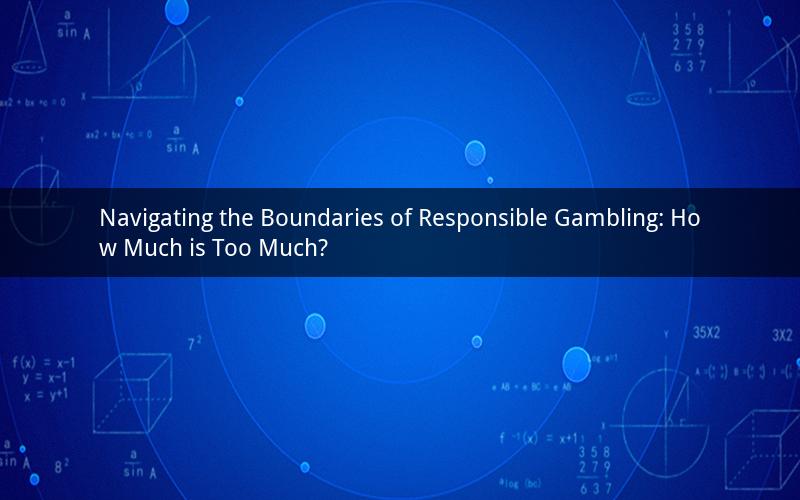
Gambling has always been a topic of great interest and debate among enthusiasts and critics alike. While many individuals find enjoyment and entertainment in the thrill of betting, it's crucial to establish boundaries to ensure responsible gambling. The question that often arises is, "How much is too much to gamble?" This article delves into the various aspects of gambling, its potential risks, and the importance of setting limits.
1. Understanding the Risks of Excessive Gambling
Excessive gambling can lead to numerous negative consequences, both financially and emotionally. It's essential to recognize the signs of problem gambling and understand the risks involved. Here are some potential risks associated with excessive gambling:
a. Financial Loss: One of the most apparent risks of excessive gambling is the potential for significant financial loss. Many individuals develop a gambling addiction, leading them to spend more money than they can afford, resulting in debt and financial distress.
b. Emotional and Psychological Impact: Problem gambling can have severe emotional and psychological consequences. It may lead to depression, anxiety, and other mental health issues. Relationships with family and friends may also suffer due to the stress and secrecy associated with gambling addiction.
c. Legal and Social Consequences: Excessive gambling can lead to legal problems, such as fraud or theft, if individuals resort to illegal means to fund their gambling habits. Moreover, it may disrupt social relationships and lead to isolation.
2. Identifying Personal Limits
Determining how much is too much to gamble depends on various factors, including personal financial situation, gambling experience, and emotional resilience. Here are some tips to help you identify your personal limits:
a. Assess Your Financial Situation: Consider your income, expenses, and savings. Ensure that you have enough funds to cover your daily needs before considering gambling. It's crucial to avoid using money designated for essential expenses or borrowing money to gamble.
b. Set a Budget: Decide on an amount you are comfortable with spending on gambling activities. Stick to this budget and avoid chasing losses. Remember, gambling should be a form of entertainment, not a way to make money.
c. Monitor Your Gambling Habits: Keep track of the time and money spent on gambling. If you notice that these habits are starting to interfere with your daily life, it may be time to reassess your limits.
3. Utilizing Tools and Resources for Responsible Gambling
There are various tools and resources available to help individuals maintain responsible gambling habits. Here are some useful resources:
a. Self-exclusion Programs: Many casinos and online gambling platforms offer self-exclusion programs, allowing individuals to ban themselves from gambling for a specific period. This can be an effective way to control excessive gambling.
b. Time Management Tools: Some gambling platforms provide time management tools that help individuals set limits on the time spent gambling. These tools can be helpful in maintaining a healthy balance between gambling and other life activities.
c. Support Groups: Joining a support group, such as Gamblers Anonymous, can provide emotional support and guidance for individuals struggling with problem gambling.
4. Recognizing the Signs of Problem Gambling
It's crucial to be aware of the signs of problem gambling to seek help early. Here are some common signs:
a. Preoccupation with Gambling: Spending a significant amount of time thinking about gambling, planning for gambling activities, or reliving past gambling experiences.
b. Loss of Control: Inability to control the amount of time and money spent on gambling, despite negative consequences.
c. Emotional Distress: Experiencing feelings of anxiety, depression, or irritability when not gambling.
d. Relationship Issues: Neglecting personal and professional responsibilities due to gambling, leading to strained relationships with family and friends.
e. Illegal Behavior: Engaging in illegal activities, such as theft or fraud, to fund gambling habits.
5. Seeking Help for Problem Gambling
If you or someone you know is struggling with problem gambling, it's essential to seek help. Here are some options for seeking support:
a. Professional Help: Consult with a mental health professional who specializes in gambling addiction. Therapy can help individuals develop coping strategies and address underlying issues contributing to their gambling problems.
b. Support Groups: Joining a support group, such as Gamblers Anonymous, can provide a sense of community and support from others who have experienced similar challenges.
c. Hotlines and Online Resources: Reach out to hotlines and online resources for guidance and support. Many organizations offer confidential assistance to individuals struggling with problem gambling.
In conclusion, determining how much is too much to gamble depends on personal limits and the potential risks involved. By understanding the risks of excessive gambling, identifying personal limits, utilizing tools and resources for responsible gambling, recognizing the signs of problem gambling, and seeking help when needed, individuals can maintain a healthy relationship with gambling and avoid the negative consequences associated with problem gambling.